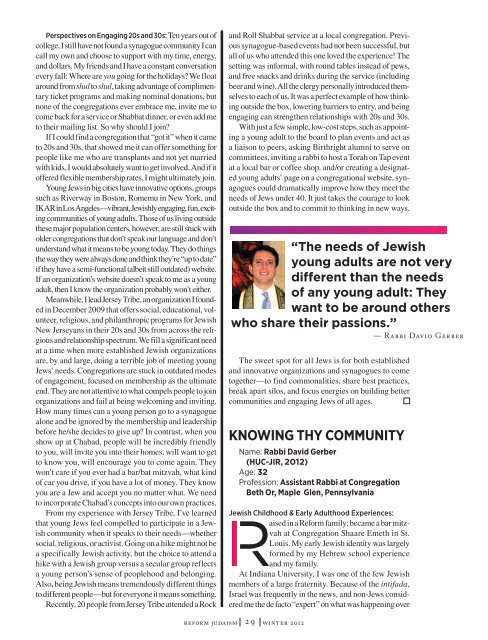reform judaism - UAHC
reform judaism - UAHC
reform judaism - UAHC
- No tags were found...
Create successful ePaper yourself
Turn your PDF publications into a flip-book with our unique Google optimized e-Paper software.
Perspectives on Engaging 20s and 30s: Ten years out ofcollege, I still have not found a synagogue community I cancall my own and choose to support with my time, energy,and dollars. My friends and I have a constant conversationevery fall: Where are you going for the holidays? We floataround from shul to shul, taking advantage of complimentaryticket programs and making nominal donations, butnone of the congregations ever embrace me, invite me tocome back for a service or Shabbat dinner, or even add meto their mailing list. So why should I join?If I could find a congregation that “got it” when it cameto 20s and 30s, that showed me it can offer something forpeople like me who are transplants and not yet marriedwith kids, I would absolutely want to get involved. And if itoffered flexible membership rates, I might ultimately join.Young Jews in big cities have innovative options, groupssuch as Riverway in Boston, Romemu in New York, andIKAR in Los Angeles—vibrant, Jewishly engaging, fun, excitingcommunities of young adults. Those of us living outsidethese major population centers, however, are still stuck witholder congregations that don’t speak our language and don’tunderstand what it means to be young today. They do thingsthe way they were always done and think they’re “up to date”if they have a semi-functional (albeit still outdated) website.If an organization’s website doesn’t speak to me as a youngadult, then I know the organization probably won’t either.Meanwhile, I lead Jersey Tribe, an organization I foundedin December 2009 that offers social, educational, volunteer,religious, and philanthropic programs for JewishNew Jerseyans in their 20s and 30s from across the religiousand relationship spectrum. We fill a significant needat a time when more established Jewish organizationsare, by and large, doing a terrible job of meeting youngJews’ needs. Congregations are stuck in outdated modesof engagement, focused on membership as the ultimateend. They are not attentive to what compels people to joinorganizations and fail at being welcoming and inviting.How many times can a young person go to a synagoguealone and be ignored by the membership and leadershipbefore he/she decides to give up? In contrast, when youshow up at Chabad, people will be incredibly friendlyto you, will invite you into their homes, will want to getto know you, will encourage you to come again. Theywon’t care if you ever had a bar/bat mitzvah, what kindof car you drive, if you have a lot of money. They knowyou are a Jew and accept you no matter what. We needto incorporate Chabad’s concepts into our own practices.From my experience with Jersey Tribe, I’ve learnedthat young Jews feel compelled to participate in a Jewishcommunity when it speaks to their needs—whethersocial, religious, or activist. Going on a hike might not bea specifically Jewish activity, but the choice to attend ahike with a Jewish group versus a secular group reflectsa young person’s sense of peoplehood and belonging.Also, being Jewish means tremendously different thingsto different people—but for everyone it means something.Recently, 20 people from Jersey Tribe attended a Rockand Roll Shabbat service at a local congregation. Previoussynagogue-based events had not been successful, butall of us who attended this one loved the experience! Thesetting was informal, with round tables instead of pews,and free snacks and drinks during the service (includingbeer and wine). All the clergy personally introduced themselvesto each of us. It was a perfect example of how thinkingoutside the box, lowering barriers to entry, and beingengaging can strengthen relationships with 20s and 30s.With just a few simple, low-cost steps, such as appointinga young adult to the board to plan events and act asa liaison to peers, asking Birthright alumni to serve oncommittees, inviting a rabbi to host a Torah on Tap eventat a local bar or coffee shop, and/or creating a designatedyoung adults’ page on a congregational website, synagoguescould dramatically improve how they meet theneeds of Jews under 40. It just takes the courage to lookoutside the box and to commit to thinking in new ways.“The needs of Jewishyoung adults are not verydifferent than the needsof any young adult: Theywant to be around otherswho share their passions.”— Rabbi David GerberThe sweet spot for all Jews is for both establishedand innovative organizations and synagogues to cometogether—to find commonalities, share best practices,break apart silos, and focus energies on building bettercommunities and engaging Jews of all ages.KNOWING THY COMMUNITYName: Rabbi David Gerber(HUC-JIR, 2012)Age: 32Profession: Assistant Rabbi at CongregationBeth Or, Maple Glen, PennsylvaniaJewish Childhood & Early Adulthood Experiences:aised in a Reform family; became a bar mitzvahat Congregation Shaare Emeth in St.Louis. My early Jewish identity was largelyformed by my Hebrew school experienceand my family.At Indiana University, I was one of the few Jewishmembers of a large fraternity. Because of the intifada,Israel was frequently in the news, and non-Jews consideredme the de facto “expert” on what was happening over<strong>reform</strong> <strong>judaism</strong> 29 winter 2012


